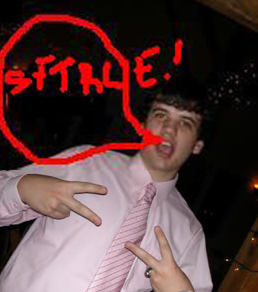
... except for that last part about it being hard to blame them.
Am I surprised? No.
In general, poker players aren't the most principled bunch. Sure, there is a small percentage of players with a real conscience, but unfortunately the poker community is riddled with a lot of shady types that will do anything for easy money. Some of those people would sell out their own grandmother if the money was right.
Therefore, it's hardly surprising to see poker players (especially broke ones) happy to sign on the dotted line for "online pro" sponsorships, regardless of the reputation of the company they're shilling for.
A few of them, like Joe Sebok, greatly suffered as a result of their decision. Unfortunately, most other pros associated with shady sites have skated away unscathed. For example, has anyone really criticized Melanie Weisner for signing with Lock?
I can tell you that I would never sign a deal to be a pro for a shady site. And if I was a pro on a site that developed a bad reputation while I was there, I would abandon ship immediately, even if I was giving up a lot of money or benefits as a result.
Professional poker is hard -- especially these days -- so I don't blame pros for taking sponsorship deals. I think that sponsored pros should use a negative check-off system when deciding whether to represent a site. They shouldn't be required (or expected to) do major investigations into the site they're representing to prove it's clean, but should never sign with a site with a bad reputation or clear indications of dishonesty. Furthermore, anyone who is a pro (or manager) of a site that is later discovered to be shady should quit immediately.
Though I am not exactly in high demand as a sponsored pro (being a 40-year-old guy who only plays tournaments during the WSOP), I can tell you that I would adhere to the above standards regarding any offers made to me. I actually was briefly a sponsored pro for both Interpoker and Sun Poker, during the 2005-2006 online poker peak when sponsorships were easy to come by.








 Reply With Quote
Reply With Quote